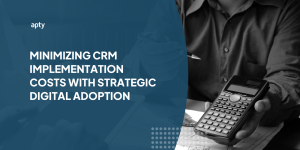Enterprise Resource Planning (ERP) systems are essential for businesses to enhance operational efficiency and effectiveness. The process of fully integrating these systems, known as ERP adoption, is critical for streamlining operations and improving decision-making capabilities.
These systems are pivotal in harmonizing various business processes, including supply chain and customer relationship management. However, the accurate measure of success in deploying these systems lies in effective ERP adoption, which is critical in maximizing technology investments, ERP ROI, and driving organizational efficiency.
ERP systems integration and effective utilization are a technological shift and a strategic move toward improving decision-making and streamlining operations. According to a report, 80% of organizations achieved the projected ROI after implementing ERP systems, while 95% of businesses reported improving their business processes. However, only 53% of customers express satisfaction with their ERP system, indicating a gap between their expectations and actual outcomes. The challenge remains in implementing these systems effectively and ensuring that all users embrace and use them to their fullest potential.
Digital Adoption Platforms are rapidly becoming essential tools in this journey. They simplify complex ERP functionalities and offer personalized training pathways; these platforms facilitate a smoother transition for users.
What is ERP Adoption?
ERP Adoption is a critical process that revolves around the effective integration and utilization of an Enterprise Resource Planning (ERP) system within an organization. This process is essential for ensuring successful ERP implementation and maximizing the system’s return on investment (ERP ROI).
Understanding ERP Adoption

ERP adoption involves several key components:
- System Integration: It’s about seamlessly integrating the ERP system with existing business processes and technology infrastructures, ensuring it works harmoniously with other systems and workflows.
- User Training and Onboarding: A critical aspect of ERP adoption is ensuring that all users, from the C-suite to operational staff, are effectively trained. This encompasses understanding the functionalities of the ERP system and how it applies to their specific roles.
- Process Alignment: It requires aligning and sometimes reengineering business processes to fully leverage the ERP system’s capabilities. This alignment is crucial for improving efficiency, accuracy, and productivity.
- Cultural Acceptance: Successful ERP adoption also hinges on organizational cultural acceptance. This means fostering a mindset that views the ERP system as an integral part of business operations.
The Significance of ERP Adoption
The importance of ERP adoption can’t be overstated, given its impact on:
- Enhancing Operational Efficiency: Enterprise Resource Planning (ERP) systems are critical in optimizing business processes and workflows to improve efficiency.
- Facilitating Informed Decision Making: Access to real-time, accurate data empowers leadership and staff to make better decisions.
- Driving Growth and Scalability: Proper ERP Adoption allows businesses to scale effectively, adapting to market changes and growth opportunities.
- Securing a Competitive Advantage: A well-adopted ERP system can provide a significant edge where timely information and efficient processes are critical.
Overcoming Challenges in ERP Adoption
Despite its advantages, ERP Adoption comes with its own set of challenges. Notably, 50% of ERP implementations fail on their first attempt, and projects often take 30% longer than estimated. This highlights businesses’ complexity and potential hurdles when integrating an ERP system with existing processes.

A robust ERP Implementation Plan is crucial to address these challenges, ensuring that the ERP system is implemented successfully and embraced by the users. This plan must consider the technical aspects and human factors, such as user resistance and the need for comprehensive training.
ERP Adoption is more than just installing a system; it’s about strategically embedding the ERP into the organization’s fabric. This integration is crucial for successful ERP Implementation and long-term operational success. Understanding and preparing for the inherent challenges in this process is essential to ensure that the advantages of an ERP system are fully realized.
Financial Considerations in ERP Implementation
– Around 45% of ERP projects exceed their budget, with the average budget per user for ERP software being approximately $8,265.
– ERP ownership is approximately 3% to 5% of annual revenue for mid-size businesses.
– Proper budgeting and cost management are crucial to the success of an ERP project, accounting for both initial and ongoing expenses.
How Do You Create ERP User Adoption?
Creating ERP User Adoption is a crucial step towards a Successful ERP Implementation. It involves strategic actions to ensure the ERP system is implemented fully integrated and utilized within the organization.
Key Strategies for ERP User Adoption

A. Inclusive Planning and Stakeholder Engagement:
- Involve representatives from various departments in the planning stage.
- Ensure that the ERP solution aligns with different business areas’ specific needs and challenges.
- This inclusive approach lays the groundwork for a Successful ERP Implementation by promoting user ownership and alignment with the ERP system.
B. Comprehensive and Customized Training Programs:
- Develop training programs that cater to the organization’s varying skill levels and roles.
- To accommodate different learning preferences, offer multiple training formats, such as in-person workshops, online tutorials, and hands-on sessions.
- Regularly update training materials to reflect system updates and changes.
C. Effective Communication and Support:
- Maintain open lines of communication throughout the ERP implementation process.
- Provide clear information about the benefits and changes the ERP system will bring.
- Establish a robust support system to resolve user queries and issues, reinforcing the success of the ERP Implementation.
D. Feedback Loops and Continuous Improvement:
- Implement mechanisms to collect user feedback on the ERP system.
- Use this feedback to continuously improve and address any issues users may encounter.
- This process helps adapt the system to evolving business needs and user expectations.
- This adaptive approach is key to maintaining the relevance and effectiveness of the ERP system, contributing to a Successful ERP Implementation.
E. Monitoring and Measuring Adoption Success:
- Monitor critical indicators of ERP system usage and user satisfaction to gauge the success of the ERP Implementation.
- These metrics include system login frequency, completion of essential tasks within the system, and user feedback scores.
- Use these insights to identify areas for further training or system enhancement.
F. Overcoming Common Barriers to ERP User Adoption
- Resistance to Change: Address fears and uncertainties by highlighting the ERP system’s benefits and providing adequate training and support.
- Complexity of the System: Simplify user experience through customized interfaces and role-based access.
- Misalignment with Business Processes: Regularly review and adjust the ERP system to ensure it remains aligned with the organization’s evolving processes and goals.
Focusing on these areas, organizations can effectively create and enhance ERP User Adoption, leading to a successful ERP Implementation. This approach maximizes ERP ROI and ensures long-term operational efficiency and effectiveness.
Digital Adoption Platforms’ Role in ERP Adoption

Digital Adoption Platforms (DAPs) are instrumental in enhancing ERP Adoption, significantly influencing the success of ERP System Implementation. These platforms bridge the gap between complex ERP functionalities and user proficiency, directly impacting ERP ROI and the overall success of ERP User Adoption.
Enhancing User Experience and Efficiency
i. User-Friendly Interface for ERP Systems:
- DAPs provide intuitive navigation and in-app support, which is crucial for simplifying user interaction with the ERP system.
- his ease of use is key to reducing the learning curve and fostering quicker and more effective ERP Adoption.
ii. Customized Training for Diverse User Needs:
- DAPs offer customized learning experiences tailored to individual user roles and needs, enhancing the effectiveness of the ERP Training process.
- This ensures that each user receives relevant training, directly contributing to more efficient ERP System Implementation and usage.
2. Mitigating Risks in ERP System Implementation
i. On-Demand Support to Reduce User Frustration:
a. Immediate assistance provided by DAPs within the ERP system helps minimize user frustration, a critical factor in preventing ERP Implementation Failure.
ii. Data-Driven Insights for Continuous ERP Improvement:
a. The analytics from DAPs offer insights into user interaction with the ERP system, allowing for ongoing improvements in the ERP Implementation Plan and practices.
iii. Lowering the Likelihood of ERP Implementation Failure:
a. By addressing common adoption challenges, DAPs play a pivotal role in reducing the risk of ERP Implementation Failure, thereby supporting a successful ERP System Implementation.
3. Elevating Organizational Capabilities through ERP Adoption
i. Scalable ERP Training and Adoption:
a. DAPs enable scalable and flexible training, which is vital for adapting to the evolving needs of a growing organization and ensuring continued success in ERP Adoption.
ii. Empowering Data-Driven Decisions:
a. Improved ERP system proficiency, facilitated by DAPs, leads to better data-driven decision-making, an essential component of successful ERP Adoption.
Digital Adoption Platforms like Apty are indispensable in modern ERP implementation strategies. They not only streamline ERP Adoption but also play a critical role in maximizing the system’s value and impact, ensuring a successful ERP Implementation and sustained organizational growth.












